The Samsung SSD 830 Review
by Anand Lal Shimpi on September 24, 2011 1:02 AM EST- Posted in
- SSDs
- Storage
- Samsung
- pm830
- Samsung SSD 830
Random Read/Write Speed
The four corners of SSD performance are as follows: random read, random write, sequential read and sequential write speed. Random accesses are generally small in size, while sequential accesses tend to be larger and thus we have the four Iometer tests we use in all of our reviews.
Our first test writes 4KB in a completely random pattern over an 8GB space of the drive to simulate the sort of random access that you'd see on an OS drive (even this is more stressful than a normal desktop user would see). I perform three concurrent IOs and run the test for 3 minutes. The results reported are in average MB/s over the entire time. We use both standard pseudo randomly generated data for each write as well as fully random data to show you both the maximum and minimum performance offered by SandForce based drives in these tests. The average performance of SF drives will likely be somewhere in between the two values for each drive you see in the graphs. For an understanding of why this matters, read our original SandForce article.
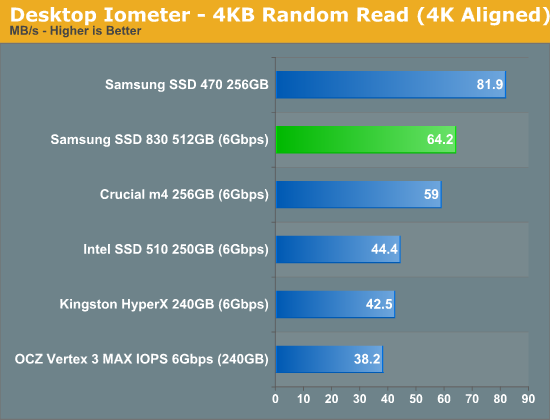
Just as we saw in Crucial's move to the m4 it looks like random read speed actually dropped a bit between the SSD 470 and 830. And just as we mentioned before, most desktop workloads don't demand super high 4KB random read performance so if this move was done to improve the 830's behavior elsewhere then it is a worthwhile tradeoff. Even with the drop however the 830 delivers the fastest 4KB random read performance of any high-end drive we've reviewed.
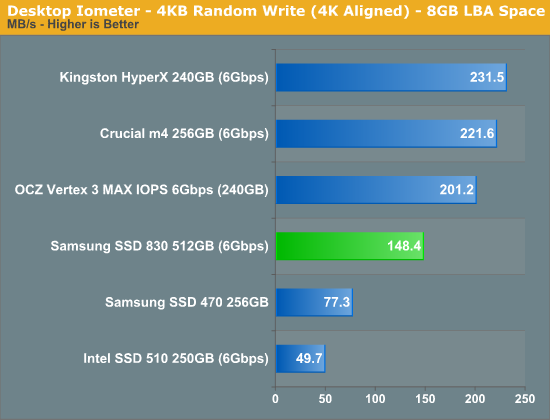
Random write performance has improved tremendously, although it's still noticeably slower than the SF-2281 drives and Crucial's m4. Similar to 4KB random read performance, there are diminishing returns beyond a certain level. Intel tends to have the right idea in how best to deal with random writes: work slower but clean up along the way, vs. write as fast as possible and rely on TRIM/idle garbage collection to improve performance later on. I've become wary whenever I see ultra high 4KB random write performance because it usually means that fragmentation can be a problem over time.
SandForce's numbers are high here because the workload is easily compressible, which is usually the case for desktop random writes as they tend to be table updates.
Many of you have asked for random write performance at higher queue depths. What I have below is our 4KB random write test performed at a queue depth of 32 instead of 3. While the vast majority of desktop usage models experience queue depths of 0 - 5, higher depths are possible in heavy I/O (and multi-user) workloads:
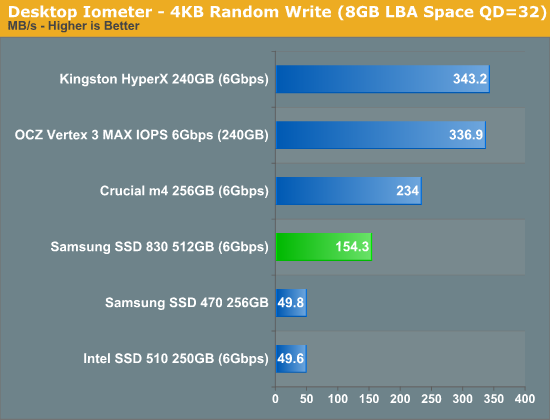
We don't see huge scaling with increasing queue depths from any of these drives really, with the exception of the SandForce solutions. Remember for the SF-2281 extra IO doesn't actually result in more writes to NAND, just a higher compression ratio which results in better performance with very little added work. I suspect SandForce's controllers could do very well in high load enterprise environments as a result. I've been working on an enterprise workload suite to figure that out...
Sequential Read/Write Speed
To measure sequential performance I ran a 1 minute long 128KB sequential test over the entire span of the drive at a queue depth of 1. The results reported are in average MB/s over the entire test length.
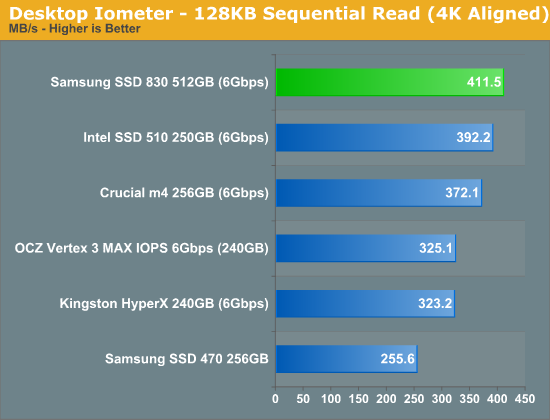
Although there are diminishing returns for ultra high random read/write operations on a desktop system, large sequential reads still scale quite well. If you do any amount of large file copying from your SSD to another SSD or file server you'll want to pay attention to these numbers here. Samsung manages to dethrone Intel at the top of our charts here with a very respectable 411.5MB/s.
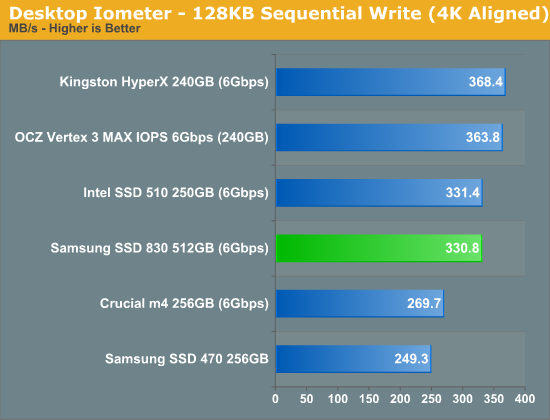
Sequential write speed is also still very important, again for those large file transfers. Despite the importance of random read/write IO the majority of desktop access patterns are still governed by sequential throughput. For an SSD to truly excel it needs good performance in all four of these categories. Thankfully for Samsung's sake, the SSD 830 delivers.










99 Comments
View All Comments
name99 - Saturday, September 24, 2011 - link
5.8W maximum power draw! Ouch.Let's note, for the record, that that means it simply won't work in a USB2 enclosure, and it work work in a USB3 enclosure (4.5W) without a Y-cable.
WTF causes this? If a magnetic hard drive can spin up on USB2 power (2.5W) I remain amazed that SSDs demand so much power when writing.
Jaybus - Tuesday, September 27, 2011 - link
The same thing that causes every transistor based device to consume power, resistivity and capacitance of the materials through which current flows. Resistance produces a loss of energy in the form of heat. Capacitance limits the rise time of the transistors, causing the duty cycle to increase as a function of frequency.Obsoleet - Thursday, January 19, 2012 - link
It's the multichannel read/writes. Takes a ton of energy even vs spinning up a portable drive like my WD Passport USB3.0 1TB.Idontcare - Saturday, September 24, 2011 - link
Loved the video too!I appreciated you candidly sharing your thoughts regarding the two schools of thought on garbage collections (real-time on-the-fly versus delayed-till-idle) :)
Brought to mind the spindle-days of setting up defrag to run during idle times versus real-time defragging that came out right before we stopped needing to defrag altogether :P
ClagMaster - Sunday, September 25, 2011 - link
For most enthusiasts obscessed with performance with money to burn, they seem to care mostly about either bandwidth or cost. They upgrade frequently and seem not to care about longterm value.For the vast majority of mainstream users, who use there computers for creating products and services of lasting (and repeatable) value, ... in short long term value. Mainstream users care the most about reliability, good support, good performance, capacity and then cost.
Thank you for your qualitative comments about the reliability of the SSDs from Samsung (and their rebranders) and its good reputation with Apple and other OEMs for their reliability. I care much more about reliability than I do some of the mind-numbing comparisons that are shown of bandwidth differences spanning about 15% from good to poor. I would rather take a 15% hit in performance from the latest and greatest Vertex III and enjoy 5 years of trouble free operation.
The two most reliable brands of SSD out there is Intel and Samsung according to Anand. Although Intel is more pricy, they offer better firmware and utility support. Like their branded motherboards (which enthusiasts mock for their conventionality but respect for their reliability), I believe Intel does active testing of their SSD's for reliability and longetivity and provides firmware support to make sure that happens. All of its other competitors do not. That is why I now have a 120 GB 510 Series on my PC.
Clearly Samsung and Intel SSD are going to be the choice for business applications.
Fun Guy - Monday, September 26, 2011 - link
"According to Anand...." Is Anand God?Nothing against the guy, but he's just a guy, and he earns money off of this site. No telling how that sways his views (consciously, or unconsciously).
I'll take the aggregate reviews over at New Egg, over any single website operator any day of the week.
JarredWalton - Monday, September 26, 2011 - link
I'd personally take Google and other aggregations of data over Newegg reviews.Jaybus - Tuesday, September 27, 2011 - link
I wouldn't. Disgruntled consumers are far more likely to review than satisfied consumers. Also, NewEgg doesn't post how many items have been sold. It is impossible to determine whether the number of one egg reviews is statistically relevant without knowing how many were purchased.tzhu07 - Friday, December 2, 2011 - link
Yup, this is true. Not to mention the tons of people at Newegg that 1-star products over issues that don't have anything to do with the product itself. For example, not getting rebates.ClagMaster - Wednesday, September 28, 2011 - link
Anand is not God.Anand is an IT professional who operates a hardware review site that I enjoy patronizing for nearly 10 years.
I respect Anand's opinions. And yes, there are some instances where I felt his opinions might have been swayed. But overall, his opinions have stood the tests of time.
I simply appreaciate Anands comments on reliability -- singling out Intel and Samsung drives for a good reputation for reliability and support (Intel).
I think Intel works very hard making sure their motherboards, peripherals and SSD's are reliabile. Intel has a facility in Oregon where they extensively test their motherboards. I am impressed because no other motherboard vendor does this.